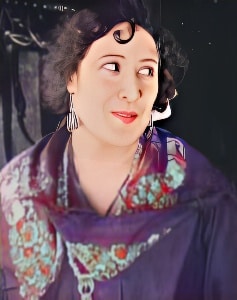 Rosita Marstini was a versatile and talented American actress known for her contributions to both silent and sound films during the early 20th century.
Rosita Marstini was a versatile and talented American actress known for her contributions to both silent and sound films during the early 20th century.
Her career spanned the transition from the silent era to the introduction of sound in cinema, highlighting her adaptability as an actress.
Born on August 13, 1873, in Vienna, Austria, as Rosina Kaski, she later adopted the stage name Rosita Marstini. She began her acting career in Europe, performing on the stages of various theaters, which provided her with a strong foundation in the dramatic arts. Her journey eventually led her to the United States, where she made a significant impact on the burgeoning film industry.
During the silent film era, Rosita Marstini established herself as a character actress with a wide range of roles. Her ability to convey complex emotions and portray a variety of characters contributed to her success in early Hollywood. One of her noteworthy silent film appearances was in “The Gaucho” (1927), where she worked alongside the legendary actor Douglas Fairbanks. In the film, she played the role of the elderly mother of the character played by Fairbanks.
Rosita Marstini’s versatility as an actress extended to her roles in both silent and sound films, leaving a lasting impact on the early years of American cinema. One of her notable silent film appearances was in the 1922 film “ Blood and Sand.” In this cinematic masterpiece, directed by Fred Niblo and starring Rudolph Valentino, she portrayed the character Encarnacion.
As the film industry underwent a transformation with the advent of sound in cinema, many actors faced the challenge of adapting to this new medium. Rosita Marstini successfully made the transition to sound films, showcasing her versatility and commitment to her craft.
Her work in both silent and sound films underscored her adaptability as an actress. While specific details about her sound film roles are not as extensively documented as her silent film career, her ability to navigate the changing landscape of the film industry demonstrated her dedication to her craft.
In the early years of American cinema, character actors like Rosita Marstini played essential roles in enriching the narratives and providing depth to the stories on screen. While leading actors often received the most recognition, character actors like Marstini were the backbone of many films, bringing authenticity and emotional resonance to their performances.
In conclusion, Rosita Marstini was a talented actress who made significant contributions to both silent and sound films during the early 20th century. Her career highlights her adaptability and versatility as an actress, as she successfully transitioned from the silent film era to the era of sound in cinema. While her name may not be as widely recognized today as some of the leading actors of her time, her performances and her commitment to her craft remain an integral part of the history of early Hollywood.




